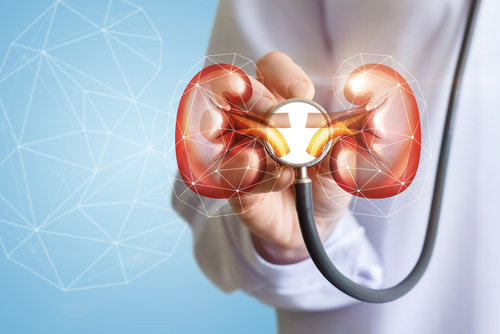CARDINAL Study Shows Bardoxolone Methyl Improves Kidney Function

Interim results from the Phase 2/3 CARDINAL trial show that using bardoxolone methyl can improve kidney function in patients with Alport syndrome.
The results were shared in a poster presentation titled, “Initial Data Report from “CARDINAL”: A Phase 2/3 Study of Bardoxolone Methyl in Patients with Alport Syndrome,” during the American Society of Nephrology Kidney Week 2017 Annual Meeting in New Orleans.
Bardoxolone methyl is an investigative therapy being developed by Reata Pharmaceuticals for the treatment of chronic kidney disease (CKD) caused by Alport syndrome, and other kidney illnesses. It was designed to trigger signaling pathways that reduce inflammation and restore mitochondrial activity. This improves renal function and has protective effects on the kidneys.
Previous clinical studies that included more than 2,600 patients with type 2 diabetes and CKD showed that bardoxolone methyl can significantly increase kidney filtration rates and other renal function parameters.
The Phase 2/3 trial (NCT03019185) is being conducted in 30 centers in the U.S. to evaluate the safety, tolerability, and effectiveness of bardoxolone methyl to treat patients with Alport syndrome.
The Phase 2 part of the trial was a dose-escalating study that included 30 patients, ages 12 to 60, with confirmed Alport syndrome and symptoms of kidney disease.
The patients were initially treated with 5 mg of the drug administrated orally, once daily. The dose was escalated to 10 mg at week 2 and up to 20 mg at week 4. Patients who presented urine albumin-to-creatinine ratio levels above 300 mg/g received 30 mg at week 6.
Interim data collected upon completion of 12 weeks of treatment showed that the investigative drug can promote clinically meaningful improvements in kidney function in these patients.
Bardoxolone methyl was shown to improve renal filtration rates in all patients compared to baseline data. Seventy-three percent of the patients improved the CKD stage, and none worsened. These positive results were observed across patients with earlier and later stages of the disease and were associated with a mean reduction of the levels of uric acid, blood urea nitrogen, and phosphorous.
Patients’ blood pressure was unchanged throughout the 12 weeks of treatment.
They also experienced a mean weight loss of 1 kg per month, which was in accordance with previous clinical and preclinical data. This may be explained by increased mitochondria function and metabolism triggered by bardoxolone methyl.
Overall, the treatment was found to be well-tolerated with no serious adverse events. The most common treatment-related adverse event reported was muscle spasms, which was generally mild to moderate in severity. Laboratory tests excluded any potential muscle toxicity that could provoke this effect.
The Phase 3 part of the study will continue to evaluate the potential effectiveness and safety of bardoxolone methyl in a double-blind, randomized, placebo-controlled study. Reata is currently recruiting participants for this part of the study, which is expected to include up to 150 participants.
For additional information, see the Contacts and Locations section of the trial’s registry page, or contact Hanh Nguyen via email at [email protected] or call 469-442-4754.







Leave a comment
Fill in the required fields to post. Your email address will not be published.